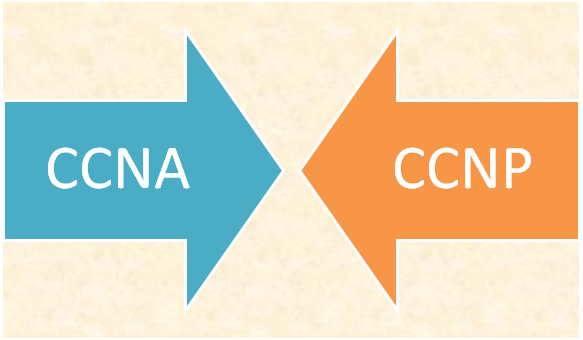What Is The Difference Between The CCNA And CCNP Certifications?
Cisco is a major producer of routers and switches that are employed in setting up a dependable and efficient network. To help the clients to choose the personnel who are capable of working with their hardware, it has established a set of certifications for those who pass their tests. Cisco offers the certification program in two paths, mainly, design and certification. The CISCO Systems awards both dedicated and general certifications. The general certifications are classified into four expertise levels in seven varied paths. The four expertise levels the certifications are awarded are the CCENT, CCNA, CCNP and CCIE. Among these certifications, CCNA and CCNP are the most important ones. The CCNA certification needs to be earned before earning the higher level CCNP certification.
The demand and importance of CCNA is growing day by day. Therefore, advance your career in the IT industry with a CCNA training course.
The Difference Between CCNA and CCNP Certifications Are As Follows:

#1. Basic Certification:
CCNA or Cisco Certified Network Associate is a very important certificate to obtain as it forms the basis to acquire other higher levels of certifications, such as CCNP. Only after acquiring the CCNA certification, a person is qualified to acquire CCNP. Thus acquiring this certification is harder than CCNA. Being CCNP certified means that the holder of this certificate is capable of doing all the tasks of the CCNA personnel, on a larger scale.
#2. Exams required To Be Taken In Order to Acquire Certifications:
In order to earn the CCNA certification, the following exams should be taken:
- The 200-120 CCNA is the composite exam: This exam tests a candidate"s knowledge and skills needed to operate, install, and troubleshoot, medium size and small enterprise branch network.
- The 100-101 Interconnecting Cisco Networking Devices Part 1 (ICND1) exams: This exam, tests the candidate’s skills and knowledge needed to successfully operate, install, and troubleshoot a small branch office network. This exam includes the topics on the Operation of IP Data Networks, such as Network Device Security; Basic Troubleshooting; IP Routing Technologies; IP Services (DHCP, NAT, ACLs); LAN Switching Technologies; and IP Addressing (IPv4 & IPv6).
- The 200-101 Interconnecting Cisco Networking Devices Part 2 (ICND2) exams: The exam covers topics on Troubleshooting; WAN Technologies; IP Services (FHRP, Syslog; SNMP v2 and v3); LAN Switching Technologies; This exam tests the candidate’s skills and knowledge needed to successfully operate, install, and troubleshoot a small branch office network.
On the other hand, the CCNP certification is a step above CCNA. In order to acquire this certificate, the candidate has to pass four more exams in addition to the above-mentioned exams, which are required to earn the CCNA certification. In order to earn the CCNP certification, the following exams need to be passed:
- 642-901 BSCI – Building Scalable Cisco Internetworks:
- 642-812 BCMSN – Building Cisco Multilayer Switched Networks
- 642-825 ISCW – Implementing Secure Converged Wide Area Networks
- 642-845 ONT – Optimizing Converged Cisco Networks
#3 Areas Of Expertise:
A person holding the CCNA certification should have the expertise to install, operate and configure the enterprise level routers and switches. The CCNA certified candidates also can implement the connections to the remote sites like the WAN, while making sure that the network is secure from all malicious attacks. They are also capable of detecting and fixing all the common problems cropping up from these networks. From this CCNA certification, a person can specialize in other branches, such as voice, security and wireless networking. These courses delve deeper into the topics and boost the capabilities of the candidates, taking up them.
On the other hand, a person certified in CCNP should have the ability of doing the tasks of a CCNA certification holder and on a larger scale. They also have the expertise to work on the networks that have nodes between 100 and 500 and beyond. This is certainly a much bigger task and more skill is needed as the networks need to be connected in a way to achieve maximum data speed and prevent choke points from appearing.
#3. Jobs with The Certifications:
- The CCNA certificate is ideal for the network administrators, network specialists and network support engineers.
- The CCNP certificate is ideal for the support engineer, systems engineer, network engineers, and other networking professionals, who have 1 to 3 years of IT networking experience.
Due to the ever growing demand of the CCNP and CCNA certifications, learn CCNA and take your career to new heights of success.
Find a course provider to learn CCNA
Java training | J2EE training | J2EE Jboss training | Apache JMeter trainingTake the next step towards your professional goals in CCNA
Don't hesitate to talk with our course advisor right now
Receive a call
Contact NowMake a call
+1-732-338-7323Take our FREE Skill Assessment Test to discover your strengths and earn a certificate upon completion.
Enroll for the next batch
CCNA Custom & real-time curriculum
- Jan 28 2026
- Online
CCNA Training Online with Certification
- Jan 29 2026
- Online
CCNA Training Online with Certification
- Jan 30 2026
- Online
Related blogs on CCNA to learn more

How CCNA certification helps the networking professional in career?
Networking career being one of the evergreen career with high career scope also engages certain requirements from the candidate. Certification is one of the most important one.

The Roadmap to Networking Career Opportunities with CISCO
The CCNA (Cisco Certified Network Associate) certification is globally recognized, as it concentrates on developing the role-based models to match the fast deployment of technologies in the modern sophisticated networking environment. Most of the ent

Learning CCNA? – Things to Keep in Mind
Certified Cisco Network Associate (CCNA) is a certification course provided by Cisco, which is the market leading vendor of the IT industry. This certification validates the ability, skill and prowess of an individual to configure, fix and troublesho

Reasons Why CCNA Certification Has an Edge Over Other Certifications
The CCNA (Cisco Certified Network Associate) certification along with the CCNP and CCIE are considered to be the most popular and sought after certifications in the IT industry. The CISCO Systems awards both dedicated and general certifications to ca

Why The Value Of CCNA Certification Is On Constant Rise?
The CCNA (Cisco Certified Network Associate) certification is emerging as the most popular IT certification in the world, as it focuses on developing role-based models to match the swift deployment of technologies in the modern sophisticated networki

How to Gain Inroads into the CCNA Computing Industry?
The computing world has earned great popularity after the advent of internet or networking communication. Computer software as well as hardware professionals enjoy higher demand value and bright career prospects. Computing experts, especially in the
Latest blogs on technology to explore

Drug Safety & Pharmacovigilance: Your 2026 Career Passport to a Booming Healthcare Industry!
Why This Course Is the Hottest Ticket for Science Grads & Healthcare Pros (No Lab Coat Required!)" The Exploding Demand for Drug Safety Experts "Did you know? The global pharmacovigilance market is set to hit $12.5B by 2026 (Grand View Research, 202

Launch Your Tech Career: Why Mastering AWS Foundation is Your Golden Ticket in 2026
There’s one skill that can open all those doors — Amazon Web Services (AWS) Foundation

Data Science in 2026: The Hottest Skill of the Decade (And How Sulekha IT Services Helps You Master It!)
Data Science: The Career that’s everywhere—and Nowhere Near Slowing Down "From Netflix recommendations to self-driving cars, data science is the secret sauce behind the tech you use every day. And here’s the kicker: The U.S. alone will have 11.5 mill

Salesforce Admin in 2026: The Career Goldmine You Didn’t Know You Needed (And How to Break In!)
The Salesforce Boom: Why Admins Are in Crazy Demand "Did you know? Salesforce is the 1 CRM platform worldwide, used by 150,000+ companies—including giants like Amazon, Coca-Cola, and Spotify (Salesforce, 2025). And here’s the kicker: Every single one

Python Power: Why 2026 Belongs to Coders Who Think in Python
If the past decade was about learning to code, the next one is about coding smarter. And in 2026, the smartest move for any IT enthusiast is learning Python — the language that powers AI models, automates the web, and drives data decisions across ind

The Tableau Revolution of 2025
"In a world drowning in data, companies aren’t just looking for analysts—they’re hunting for storytellers who can turn numbers into decisions. Enter Tableau, the #1 data visualization tool used by 86% of Fortune 500 companies (Tableau, 2024). Whether

From Student to AI Pro: What Does Prompt Engineering Entail and How Do You Start?
Explore the growing field of prompt engineering, a vital skill for AI enthusiasts. Learn how to craft optimized prompts for tools like ChatGPT and Gemini, and discover the career opportunities and skills needed to succeed in this fast-evolving indust

How Security Classification Guides Strengthen Data Protection in Modern Cybersecurity
A Security Classification Guide (SCG) defines data protection standards, ensuring sensitive information is handled securely across all levels. By outlining confidentiality, access controls, and declassification procedures, SCGs strengthen cybersecuri

Artificial Intelligence – A Growing Field of Study for Modern Learners
Artificial Intelligence is becoming a top study choice due to high job demand and future scope. This blog explains key subjects, career opportunities, and a simple AI study roadmap to help beginners start learning and build a strong career in the AI

Java in 2026: Why This ‘Old’ Language Is Still Your Golden Ticket to a Tech Career (And Where to Learn It!
Think Java is old news? Think again! 90% of Fortune 500 companies (yes, including Google, Amazon, and Netflix) run on Java (Oracle, 2025). From Android apps to banking systems, Java is the backbone of tech—and Sulekha IT Services is your fast track t